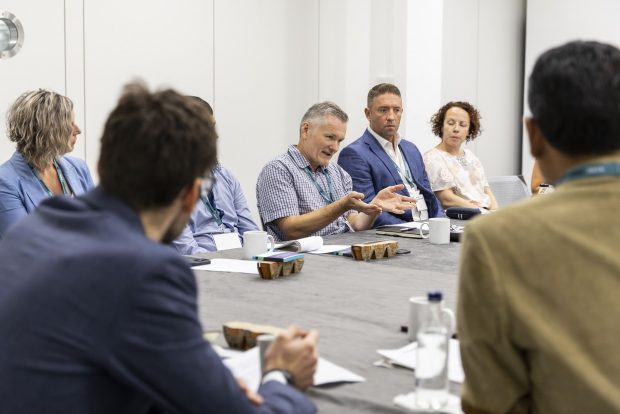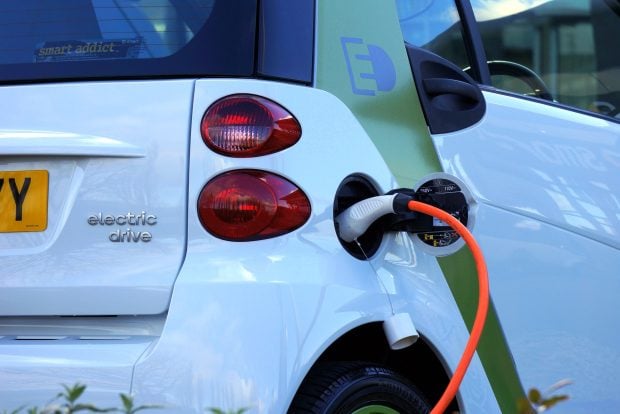Sir Philip Lowe, former Director-General of Competition and of Energy, European Commission: Exclusive Interview

During a four-decade career at the European Commission, Sir Philip Lowe played a key role in developing competition policy and energy markets; and now he’s watching as his own country detaches itself from the bloc. Ian Hall meets him
As far as Britain’s European Union (EU) membership – set to end in March 2019 – is concerned, Sir Philip Lowe has seen the whole story from the inside.
Lowe retired from the European Commission (EC) 4.5 years ago, having joined in 1973 – the year that the UK joined the-then European Communities. How times change.
During those four decades in Brussels, Lowe held positions across the EC’s responsibilities – including chef de cabinet and director roles in the fields of regional development, agriculture, transport, administration and development. But from 2002, he spent eight years leading the EC’s work on competition – putting him at the heart of the Single Market’s development – and between 2010 and 2013, he served as Director-General of Energy.
Mixed up on energy
In this latter role, Lowe bumped up against some of the same issues he’d encountered in his job as competition chief – for Europe is a patchwork quilt of energy systems, and moves to knit them together have inevitably been incremental.
It’s not consumer resistance to buying from overseas that has slowed progress, he says when we meet at the London base of economics advisers Oxera: “People don’t really care about where their electricity comes from.” Germany has made the decision to abandon nuclear power, he adds, but “a lot of Germans are probably consuming at one point French electricity, which [can come from] nuclear.”
“The issue of energy mix is: ‘What kind of electricity production can we tolerate on our own territory?’ In the UK, it seems that nothing is tolerable, apart from off-shore wind – as long as people can’t see the turbines! – and nuclear. In Germany nuclear is not tolerated, and on- and off-shore wind is. ”
Getting connected
But if policy differences don’t impede the buying and selling of power across national boundaries, a lack of physical interconnectivity does. The level of connectivity between the UK and the Continent, like that between the Iberian Peninsula and the rest of Europe, stands about 6%, says Lowe; between Belgium, the Netherlands and Germany, the equivalent figure is around 24%. So the UK and Spain are missing out on many of the potential benefits of a single energy market: “You have a lot of pay-offs from doing things at a European level,” he argues.
The sluggish nature of progress on connecting grids clearly frustrates him. “I think a major cause of frustration for anyone working on European energy policy was the degree to which it seemed to be impossible to move very fast on issues such as developing Europe-wide network codes, so that gas and electricity could pass easily through interconnections where there was a clear market model there,” he comments.
This brings us on to ‘external’ challenges with EU energy policy, including Russia – Lowe estimates that he made more than 20 visits to Moscow in four years – and climate change.
On the latter, there’s been a major bump in the road since Lowe retired: US President Donald Trump’s announcement that the US would withdraw from the 2015 Paris Agreement. “I’m not alone in thinking that a lot of the challenges to our economies and societies are now global, from environmental challenges to migration. They are not going to be solved by less international co-operation, but by more,” he says. But in the short-term, he sees little room for change here: “The issue is: who voted Trump in? And have their views changed at all?”
EU influence on competition and anti-trust
Lowe’s instinct for international co-operation also shines through when he details his years heading the Commission’s Directorate-General for Competition.
There is an ever-growing tapestry of players in the global governance architecture for competition, and Lowe believes that the EC has played a key role in strengthening market competition worldwide. “There was concern that the OECD framework for co-ordinating competition policies throughout the world was very much an exclusive club of developed nations,” he recalls. “That had the effect of stimulating the International Competition Network (ICN). I went to the first annual conference in Naples in 2002 – it was a major breakthrough. Maybe then there were about 40 to 50 anti-trust authorities [regulating market competition] around the world; now there are 150. The impetus for that initiative was the US and the EU.”
The EU’s internal diversity has, Lowe believes, led it to build anti-trust frameworks that can usefully be applied across a wide range of economies: “If you look at things purely from an Anglo-Saxon point of view, you tend to neglect the diversity of economies and cultures throughout the world,” he says. “If the EU – with the diversity of economies it has – agrees on something, it’s very likely that that model will appeal to other countries and regions around the world; and it does.”
Keep talking
As an example, he says: “My US colleagues would say they had major influence on the new Chinese anti-monopoly law from 2005 onwards, and I’d agree. But if you look at the structure and the wording, I think you’d find that – on balance – the European model on anti-trust and state-aid control is more prevalent in Chinese law than the US, though both jurisdictions had a major influence. I would say the US and the EU have benefitted hugely since the early 1990s from major dialogue on all aspects of anti-trust and merger control, which has improved both systems.”
And how do EC officials decide at which level to address competition issues? “You would ask: ‘What is the key issue, what is the relevant market, and who are the competitors? Is this a global, European or national market?’,” he replies.
“If it’s a national market, then there’s probably a case for saying the issue could be dealt with at a national level. You don’t look at it in terms of 28 countries; you look at it first of all by asking: ‘Where’s the market? And what is the potential for competition?”
EU priorities looking ahead
So in the realms of energy and competition, where should today’s priorities lie?
On energy, his first answer is: climate change. Europe’s CO2 emissions form a rapidly declining share of the global total, he notes; yet “Europe’s voice in climate negotiations has – so far – punched above its weight. So it has to use all its powers of advocacy vis-à-vis China and India, together with Japan and Korea, to keep the Paris consensus going, notwithstanding the federal view in the US.
“That said, a very significant number of US states are committed to climate change and there is no need to be pessimistic. But the EU has to maintain a very strong voice.”
On the EU’s internal energy market, he urges more help for “those countries, such as Poland, that have a challenge with their energy mix,” and argues that “this issue of mutual trust between states [has to be] tackled by making sure that this integrated system becomes a reality – giving a lot of attention to the nitty-gritty of making markets work.”
And the priorities on competition policy? “The EU as an anti-trust authority is a global player, but it has to co-operate and it has to devise solutions for problems on global markets,” he replies.
“Most multinational corporations don’t want to Balkanise the remedies concerned: for example, if there’s something wrong with Android it has to be fixed not just for Europe, but for the world. There are good prospects that that can happen. The cooperation between antitrust authorities, informally and formally, is quite strong. With the internationalisation of markets, the EU has to become even more international; and it has to continue to maintain a good consensus between itself and national competition authorities, so they feel part of the process.”
Britain’s influence in Europe
There it is again; the need for stronger international cooperation. Which brings us to Brexit.
Lowe, as you would expect, is laden with examples of the UK’s influence on EU policy development. His almost unparalleled length of tenure in Brussels allows him to reflect on the bloc’s foundation as the European Coal and Steel Community (ECSC), and the circumstances of the 1970s.
Back then, he recalls, the EU was involved in “reorienting coal-and-steel areas, whether in Wales, Scotland or, say, in Saarland [Germany] to other sectors. That’s a long process, something Poland is being faced with [today]. This doesn’t take just 10 to 20 years; it takes 30 to 40 years. The amount of support given was very, very significant.”
He also references farming – a famously large swallower of EU spending. “The whole debate about the direction of the Common Agricultural Policy (CAP) was heavily influenced by UK criticism,” he says, moving on to extol the benefits of product standardisation in areas such as manufacturing and consumer-goods.
In Lowe’s view, “one of the UK’s major contributions” to the EU was the pressure it brought to “get ‘bangs for bucks’ in respect of how programmes are administered. Never has there been greater scrutiny – and pressure on – public-sector spending, Lowe says. “The pressure to keep European funding at a tolerable level – perhaps too tolerable, in respect of the 1% ceiling [capping EU budgets at 1% of the bloc’s gross national income] – constrains a lot of policies that should have been developed. But nevertheless, [Britain’s pressure for budgetary efficiency] could be regarded as a positive thing.”
Lowe’s former Brussels colleagues are now having to plan for the absence of the UK’s contributions to the EU machinery – in every sense. But that’s another story.
























Dear Sir Philip Lowe.
Please promote retrofitting wind turbine and pylon supports with solar PVC – the most cost effective transition strategy, ans to include co2 extraction mechanisms the pure stream gas being conveyed to enclosed sapling and horticulture nurseries.
Please insist on a UN CLIMATE AND CONSERVATION ACTION PROGRAM to restore reflectivity, now its loss accounts for half annual warming. Please suggest the poorest people will be properly paid to do the de-geoengineering, turning black tarmac white and vegetating barren rock, and also the geoengineering work – whitening ice bereft rocks bordering dwindling glaciers.
Please point out that if governments are working on regeneration projects together they will not fight each other